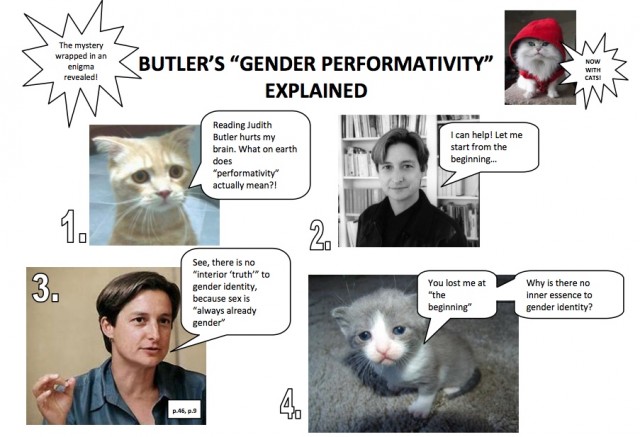Boys Will Be Boys | Gender performativity
Thu 16 Jun 2016 |
Our Plays, The Bigger Picture
We couldn’t really put on a play called Boys Will Be Boys without talking Judith Butler. This blog will give a very brief overview the arguments Butler put forward in her seminal work Gender Trouble: Feminism and the Subversion of Identity (1990).
And when we fail at this we will turn to some cats to explain it. Because INTERNET. If you would like to skip straight to the cats click here.
Who is Judith Butler?
Butler is an American philosopher and gender theorist whose work has influenced political philosophy, ethics and the fields of feminist, queer and literary theory.
She is best known for two books: Gender Trouble and Bodies That Matter: On the Discursive Limits of Sex. Both of these works challenge conventional notions of gender and develop her theory of gender performativity.
What’s Gender Trouble all about?
In Gender Trouble, Butler argued that feminism had made a mistake by trying to assert that “women” were a group with common characteristics and interests. That approach, Butler said, performed ‘an unwitting regulation and reification of gender relations’ – reinforcing a binary view of gender relations in which human beings are divided into two clear-cut groups: women and men. Rather than opening up possibilities for a person to form and choose their own individual identity, therefore, feminism had closed the options down.
Butler goes on to argue that rather than being a fixed attribute in a person, gender should be seen as a fluid variable which shifts and changes in different contexts and at different times.
So far so very 2016. We now live in a world where gender fluidity is more than just understood, it’s zeitgeist. But how far have we come? Consider, for example, the fact that in the ongoing (never ending) EU Referendum Debate, commentators on both sides often ask about the issues that are important to women. As if women aren’t 51% of the population. As if women think with one hive mind.
So what is gender performativity?
So, as we said, Butler characterises gender as the effect of reiterated acting, one that produces the effect of a static or normal gender while obscuring the contradiction and instability of any single person’s gender act. This effect produces what we can consider to be ‘true gender’, a narrative that is sustained by ‘the tacit collective agreement to perform, produce, and sustain discrete and polar genders as cultural fictions is obscured by the credibility of those productions – and the punishments that attend not agreeing to believe in them.’
Basically, Butler says ‘there is no gender identity behind the expressions of gender; … identity is performatively constituted by the very “expressions” that are said to be its results.’ In other words, gender is a performance; it’s what you do at particular times, rather than a universal who you are.
Got that? No. Okay, try this infographic/educational cartoon Judith Butler Explained With Cats by Hannah McCann featured on her blog BinaryThis.


To find out more about Boys Will Be Boys or to book tickets click here

Sources:
Wikipedia (because INTERNET)
theory.org.uk
A long ago lecture at the University of Edinburgh, half hungover.






